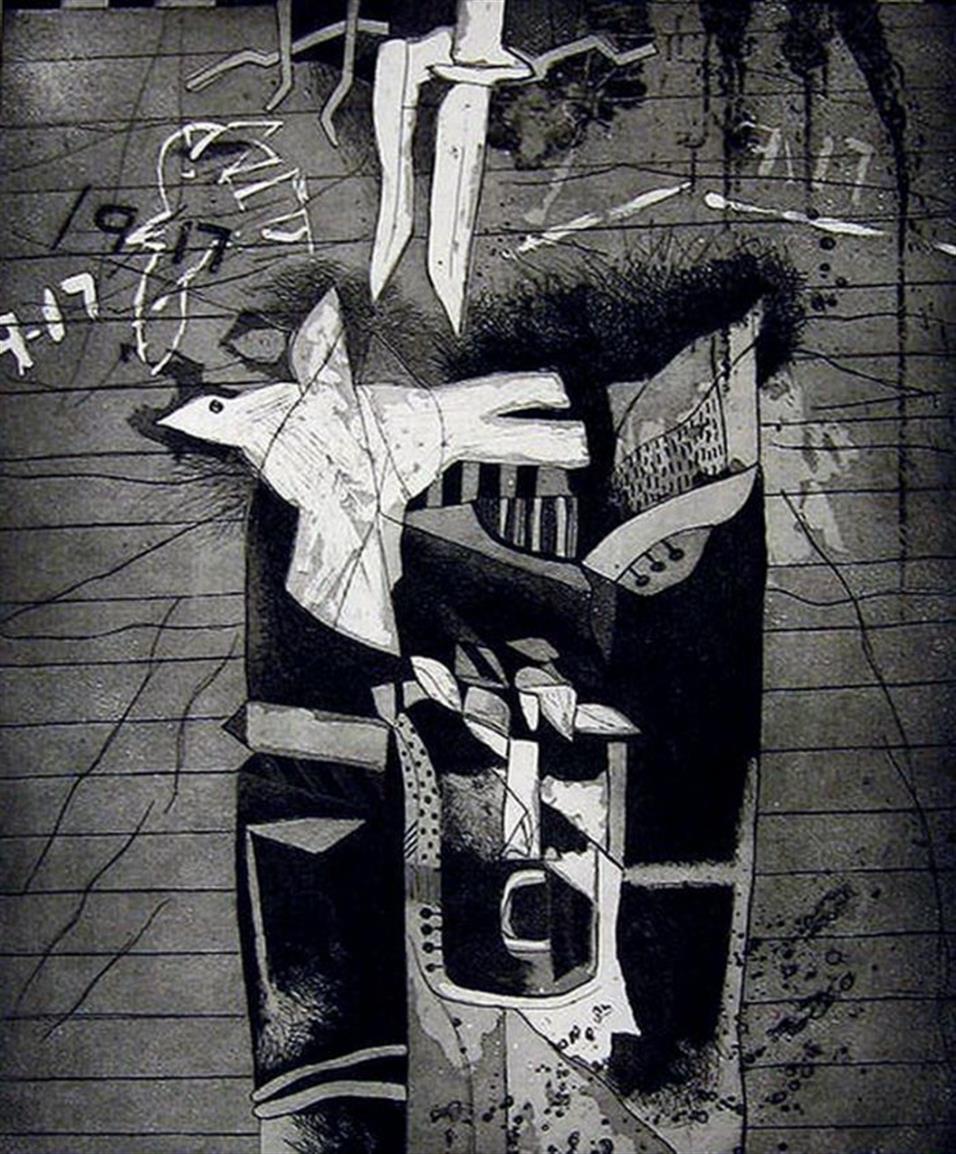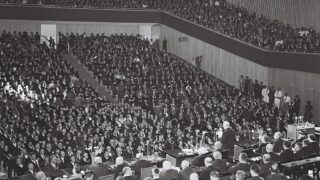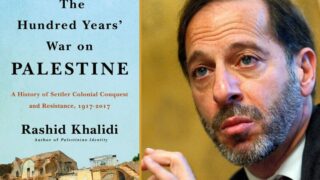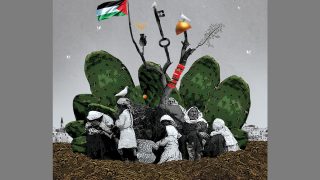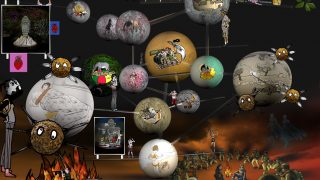During the last ten weeks, Assafir al Arabi published ten clips by filmmaker Eyal Sivan. Under the title of “Jewish voices against racism” the clips cover interviews of members of the Union Juive Française pour la Paix – the French Jewish Union for Peace on subjects such as racism, anti-colonialism, Zionism etc. The UJFP was founded in 1994 just after the signature of the Oslo Agreements with a clear focus on Palestine – seeking a fair settlement in the Palestine-Israel conflict. Contrary to the Zionist left peace movements and organisations such as Peace Now, J Street and many others, that deplore occupation without questioning the ideology and domination system behind it, the UJFP analyses the Palestine Question through the lens of settler-colonialism and tries to convey secular and progressive Jewish voices for commonness in Palestine-Israel and in France by fighting against racism, colonialism and all discriminations.
This piece attempts to bring context to the clips of the UJFP by addressing French political background and presenting a historical overview of Jewish opposition to Zionism.
Being a Jewish anti-Zionist organisation in France
France is the home of the second most numerous Jewish population in the world after the United States and as such, it has been a target for Israeli propaganda. The consecutive Israeli governments have led campaigns to increase French Jewish emigration to Israel manipulating anti-Semitism to support their case. One of Israel's most fervent supporters and propagandists in France is the CRIF (Conseil Représentatitif des Institutions Juives de France). As the equivalent of the AIPAC in the United States, it is known for its bland support of Israel. It also claims to represent France's Jews and tends to discard and suppress any dissonant voice. During the last decades, the annual dinner organised by the CRIF has become an absolute must for politicians who on the occasion profess their love of Israel and their rejection of anti-Semitism. The CRIF has been pushing to include anti-Zionism in the legal definition of anti-Semitism to criminalise any critic of Israel. Recently, it has found supporters among French politicians and in the first place the President, Emmanuel Macron, himself. The latter indeed considers that anti-Zionism is “a reinvented form of anti-Semitism”.
Facing Zionist monopolisation of Jewish identity and the confiscation of their voices, non and anti-Zionist Jewish organisations have decided to speak from a Jewish self, and it was not a light step for most of the UJFP's members. But seeing that Israel and Zionist organisations have been confiscating their voices, they decided to embrace politically their Jewish identity. They reject the monopolisation of Jewish identity by Zionist groups, refuse to be assimilated to or represented by Israel and its politics and to be used as pawns in the racist management of Muslims/ Arabs and Blacks.
Although they do agree with the anti-Zionist principle stance of orthodox Judaism, , they do not feel represented by them. For one, whilst the majority of the UJFP's members are Jewish (it is open to anyone who adheres to its objectives), the organisation itself is secular. Then and most importantly, members of the UJFP – but this is also true for most non or anti-Zionist Jewish organisations – propose other Jewish identities far from the ethno-nationalist one represented by Zionism or the religious anti-Zionist one. These Jewish identities rooted in a universalistic outlook are diverse and may be secular or religious – practice falling into the realm of privacy. What really calls them to adhere to these secular Jewish organisations has to do with the values and objectives they convey.
In the middle of the second Intifada, in 2002, the UJFP played a leading role in the foundation of the EJJP, European Jews for a Just Peace, that now federates Jewish organisations from ten countries among which: Belgium, Germany, Italy, Sweden etc. Along with groups from the Americas (such as Jewish Voice for Peace or the IJAN-International Jewish Anti-Zionist Network), they have joined the BDS campaign but most of them have set their action beyond the struggle against Zionism and Israel’s destructive policies. Most of them are part of larger movements – feminist, anti-racist, anti-colonialist, against police violence etc. The UJFP which rejects any hierarchy in racisms (all racisms being under the same umbrella of Racism) was for instance one of the first organisations in France to acknowledge the development of Islamophobia and to call it by its name.
Receding chronology, fragmented narratives
24-09-2014
The ten clips which tackle subjects such as institutional or state racism, anti-Semitism, anti-Zionism and anti-colonialism show how much the Palestine Question is linked to global events and issues. But also how mechanisms of exclusion, discrimination and (state) violence in Palestine are enlightening on a global level.
Although they are indeed minoritarian in the public and mediatic space, they have chosen their place and it is alongside the oppressed. They are the reminder one needs when tackling Zionism, a reminder that says Zionism is definitely not Judaism, it is colonialism, racism and hegemonism. Furthermore, as one of the UJFP members states in one of the clips, « I think there are plenty of reasons to be anti-Zionist, being Jewish is one of them ».
This opposition to Zionism has been around for more than a hundred years and even though they sometimes do not know the debt they owe to earlier Jewish anti-Zionist groups, these organisations are part of a long tradition of anti-Zionist activism.
Early Jewish opposition to Zionism
Zionism emerged in Europe as a response to both Jewish assimilation in the West, and anti-Semitism. Zionism and its programme raised polemics and anxiety among many Jews as soon as it emerged in Europe in the late 19th Century. Not only did Zionism seek to represent all Jews, but it sought to erase their historical significance, threaten the status enjoyed by Jews, negate the exile so central in Judaism and obliterate Jewish explanations or meaning. Critique came from Jewish communities and personalities all around the world first within Europe itself, in the Arab countries once it became known, but also in the United States where before WWII, the organised Jewish communities expressed a vivid opposition.
Three important critical trends were to stand out. First, a liberal anti-separatist trend, second, a religious critique of the secular character of Zionism as a false messianism, then, socialist and communist critiques of a capitalist and nationalist endeavour.
• Emancipation vs Zionism
First, when Zionism appeared, it was perceived as threatening to the status of those Jews who were believers in the Emancipation as an ideal of the Enlightenment be it in France, in Germany or Great Britain. They felt they were first and foremost Germans, French and British and that calling for a Jewish nationality would not only jeopardise their status by creating a separation between nationals but also provide arguments for anti-Semitism and the exclusion of Jewish members from the national community. This argument was also the one raised in the United Kingdom by the opponents to Zionism before and after the decision of the British government to adopt the Balfour Declaration, among these are Claude Montefiore (the president of the Anglo-Jewish association and one of the founders of British liberal Judaism) and Edwin Montagu (then Secretary of State for India and member of the War Cabinet) (1) .
• A religious critique of Zionism
Religious critique of Zionism was raised outside but also within the Zionist movement, under three main arguments (2). First, Jews are not a nation but a community of faith. Second, based on a theological argument, Zionism is a false messianism threatening true divine redemption, this was particularly the case of the Haredim or orthodox and ultra-orthodox Jews. Third, it is not applying the principles of Judaism such as non violence and fairness with the others.
In fact, the idea of Jewish colonisation of Palestine was not very popular among Jewish communities. Appeals for immigration to Palestine were rarely followed and the majority of the Jews already present in Palestine viewed with suspicion the first Jewish immigrants in the 1880s.
Two of the most well-known anti-Zionist Haredi group are Satmar and Neturei Karta. Both based in the United States with communities in Palestine, they consider the state of Israel as illegitimate. Neturei Karta which enjoys a particular attention among Arabs, was created in 1938 in Jerusalem from a split within Agudat Israel which was seen as becoming accommodating with Zionism (3).
Until today both ultra-orthodox groups refuse to participate in elections and call Jews not to vote, they refuse to serve in the army, and when they already live in Palestine, they consider themselves in exile. For instance the American Council for Judaism was founded in 1942.
Before the establishment of Israel, other groups showed an aversion to Zionism, such as the American Council for Judaism (ACJ) was born in the Reform Judaism tradition which was elaborated in Germany and was later to develop in the United States. Founded in 1942 – the very year that the Zionist leaders met in the United States to compose the Biltmore programme that aimed at creating a Jewish State in all of Palestine – it considered the Jews as a religious community and rejected the idea of a nation, thus their express objective was to fight Zionism and the establishment of a Jewish State in Palestine (4). Soon, the ACJ was to open its doors to secular critiques of Zionism.
• Socialist and communist critiques of Zionism
Two main movements are here especially relevant, on the one hand, the Palestine Communist Party and on the other hand, the socialist Bund based in the Russian Empire(5). Both were secular movements that rejected Zionism as a solution to the “Jewish question” and refused to establish a dichotomy between the Jews and the non-Jews.
Founded in the late 1880s, the Bund refused any ethnic and territorial separation preferring to fight for their rights as a national minority within the countries they lived in and to integrate the paradigm of cultural autonomy in diaspora instead of the territoriality proposed by Zionism. Moreover, the Bund considered the Zionist movement as assimilationist in the sense that it had integrated capitalist agenda, structures and objectives which not only ignored class struggle but would reproduce in Palestine the same models of exploitation and domination that existed everywhere else. This was to be confirmed early on when as part of the Jewish labour policy aiming at the exclusion of the Arab workforce, the Zionist movement decided to bring some 2000 Jewish Yemeni workers to replace the other Arabs (6) . The latter had to face exploitation and discrimination in a society not only aiming at creating a Jewish state but also a new Jew following the model of the “gentile Jew” in Western Europe and the United States, in fact a homogeneous nation of European “gentile” Jews thus calling for a kind of civilizing mission (7).
Although the Bund only became active in Israel in 1951, it had members there since the 1920s. The last members of the organisation are now dying but they kept advocating socialism though only a minority among them remained non-Zionists (and not anti-Zionists) (8).
Created in the 1920s, the Palestine Communist Party, member of the Communist International strayed from its precursors on the question of Zionism. It considered the Zionist movement as an ally of British Imperialism and that every activity “of the Zionist institutions prepare the ground for capitalist colonisation at the expense of the exploited masses” (9). Gaining Arab members from the late 1920s it eventually split in 1944. Initially rejecting partition in 1947, both Jewish and Arab factions eventually followed the USSR's vote.
Jewish anti-Zionism in the age of Israel
Zionism had raised opposition as soon as it emerged, it was a minority movement but Imperialist and international Institutions' support to the movement as well as the Nazi genocide of the Jews eventually reversed the situation. Anyway, soon after it received the green light from British authorities to settle in Palestine, Zionism demonstrated that it indeed was all what its critiques feared it to be. Soon, it would show that apart from the Palestinians, there were other populations that suffered from Zionist ideology and practices and from state racism. These were the Jewish Arabs (Mizrahi Jews) that were brought in the 1950s and placed on the map as human shields against the “other” Arabs, then the Falashas or the black Jews mainly from Ethiopia. Seen as savages, in an assimilationist mission, both communities were subjected to attempts to strip them from their cultures, such attempts included the confiscation and disappearance of hundreds of Yemenite babies from their parents. These two communities have also been the victims of a social domination in a space governed mainly by Ashkenazi Jews.
After the establishment of Israel, the Communist party that placed itself within the Zionist political spectrum continued to hold a dissonant voice on social issues. In the 1960s, leftist organisations emerged, sometimes out of the communist party. Some of them claimed an affiliation with the Fourth International. One of these, the Israeli Socialist Organisation was founded in 1962 and was later to be known by the name of its journal, Matzpen. The organisation advocated first, the union of Jewish and Arab working classes and the integration of Jews not only in Palestine but in the region. Second, they called for the resolution of the Palestine Question in its Arab environment and not only in mandatory Palestine which did not exist before the British administration. Then, it called for a struggle against Imperialism and against the discrimination and oppression of the Palestinian people. Very soon after its creation, Matzpen was to become openly anti-Zionist and shake the political landscape by analysing Zionism as colonial in nature and identifying a settler colonial type. This is what differentiated between them and other leftist groups and parties (10).
Although it was a very small and marginal group, it became for years public enemy number one for the Israeli government. The negative attention it enjoyed made it also known abroad, where its members were invited by numerous Socialist organisations as well as Arab and Palestinian students' organisations and Palestinian resistance movements with which they developed contacts. By the 1970s, Matzpen was in contact with the FDLP and later with the PFLP. For years it continued its activities and inspired groups from the margins of the society such as the Israeli Black Panthers – also inspired by the Black Panthers. The Israeli Black Panthers embraced Matzpen's anti-Zionism while fighting for the rights of racialised Jewish Israelis who were discriminated against. While they only lasted for a year – its members were either jailed, pushed to leave or offered positions among the government in order to appease them and gain voters – they were among the first to reach to Palestinians. Jewish Arabs were later presented with more traditional and nationalist alternatives, notably right wing religious parties such as the Shass.
Whilst Matzpen called for the de-zionisation of Israel, the return of the Palestinian refugees and condemned the discriminatory policy of Israel, some of its members also called the Palestinians to recognise the self-determination right of the “Hebrew nation”(11) as a way to reassure the Jewish masses and have them adhere to the overthrowing of the Zionist regime, “the abolition of the institutions and the establishment of equality with the Palestinians and the integration of the country's peoples into a regional socialist union” (12). The notion of “Hebrew nation” caused debates inside the organisation as other members considered it would jeopardise the rights of the indigenous, the Palestinians.
During the 1970s, three splits took place within the organisation mostly for ideological and strategic reasons, but all groups that emanated from Matzpen remained anti-Zionist and by the end of the 1980s it had ceased to exist as a coherent and functional group. However, it continued to inspire Jewish anti-Zionist activists in Israel and in the diaspora and until recently its remaining members were still active. Today, political parties and organisations are being deserted for NGOs, movements and looser organisations proposing another activism more grounded in the field but also more specialised (house demolitions, civil rights etc.). Furthermore, the BDS campaign proposes to act as an umbrella for dissonant organisations and groups. To that, we can add the preponderance of media as shown by the number of alternative (non or anti-Zionist) magazines and journals, based inside and outside Palestine-Israel, that provide analyses of the Palestine Question through the prism of settler-colonialism (Alternative information Center publishes journals in three languages, 972mag, Mondoweiss etc.).
Conclusion: Opposing Zionism as a system of domination and hegemonism
As we have seen, there has been a persistence of Jewish critical voices against Zionism since it emerged. The arguments raised then and now are similar in essence. However, the predictions made by its early critics have proven to be true. Israel is indeed a secular state rooted in an exclusive ethnic nationalism – using religion to fuel its state racism and discriminate against Palestinians from ethnic cleansing to the denial of civil rights. Furthermore, it is one of the outposts of capitalism, with important social inequalities.
One of the tools the Zionist movement and Israel have been using to the detriment of Palestine, the Palestinians and the Arabs as well as of the Jews all around the world, is the manipulation of Judaism and Jewish identity. The Zionist movement and Israel have been trying – quite successfully – to impose everywhere to everyone the equation according to which Jewish equals Zionist equals Israeli. An equation that is detrimental to Jews as it extracts them from their national communities and encourages the rise of Anti-Semitism, but also to the understanding of the Palestine Question as it attempts to prevent and criminalise political critical analyses of Zionism as a settler-colonial project and Israel as a settler colonial state.
By refusing the manipulation of Judaism and Jewish identity by the Zionist movement and Israel, the UJFP and other secular Jewish anti-Zionists point up to Zionist ideology and system of domination – ethnic nationalism, racism, capitalism.
1- Guediri, Kawthar, “The Balfour Declaration”, Assafir al Arabi, 17-11-2016.
2- The Binationalists who were part of the Zionist movement were particularly critical of mainstream Zionism and the idea of a Jewish State in Palestine.
3- Glass, Charles, “Jews against Zion: Israeli-Jewish anti-Zionism”, Journal of Palestine Studies 5(1/2), Autumn 1975 – Winter 1976, pp. 56-81.
4- Kolsky, Thomas A., Jews against Zionism, The American Council for Judaism, 1942-1948, Temple University Press, 1990.
5- Algemeyner Yidisher Arbeter Bund in Lyte, Poyln un Russland in Yiddish the language used by most of the Jewish workers in Western Europe and the Russian Empire. The General Jewish Labour Bund of Lithuania, Poland and Russia was a secular Jewish socialist party in the Russian Empire founded in 1897 the year of the first Zionist Congress in Basel, Switzerland.
6- Massad, Joseph, The persistance of the Palestine Question, essays on Zionism and the Palestinians, p. 57.
8- Watch Eran Turbiner documentary film on the Bund in Israel.
9- Beinen, Joel, “The Palestine Communist Party”, 1919-1948, MERIP Reports, March 1977.
10- Greenstein, Ran, Zionism and its discontents, a century of radical dissent in Israel/Palestine, p. 165.
11- The Socialist Organisation in Israel (Matzpen), The Palestine problem and the Israeli-Arab dispute, May 18, 1967. http://98.130.214.177/index.asp?u=120&p=doc1
12- This forms the twelfth point of the fundamental principles of Matzpen which were adopted in 1973 and amended in 1978. Available on Matzpen's website: http://98.130.214.177/index.asp?p=principles

